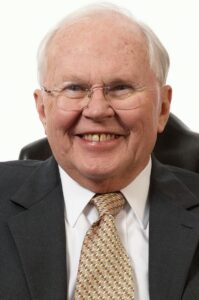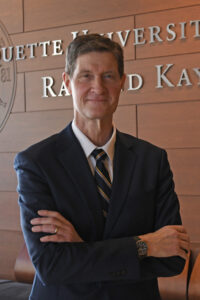Witnesses—and Recalling Michael Ash and Jo Kolanda

Now that I have introduced myself in my first blog post, let me make good on some of my promises to look back on—and forward to—the criminal justice system in this region and beyond. This is an appropriate place to do so: Marquette University and the Milwaukee County District Attorney’s Office played a significant yet mostly unknown role in improving how witnesses in criminal cases have been treated in our country during the last 50 years.
The heart of the adversarial justice system in the United States is the direct involvement of citizens in a structured process that peacefully resolves conflict by balancing the rights of individuals with the collective needs and responsibilities of the community. People reluctantly encounter the criminal justice system in four general categories: as defendants, victims, witnesses, and jurors. Each category shares one thing in common: almost no one volunteers or wishes to be so identified. And while the resources directed toward victims and witnesses and defendants have improved over time, a strong need persists to reexamine and refresh how we treat our community members in the contemporary court system. A new generation of lawyers should embrace that challenge, because how we treat people in our justice system is among the clearest mirrors of who we are as a community.
In 2008 Professor Dan Blinka moderated a panel at the Law School that discussed criminal plea bargaining in Wisconsin and asked about the role of victims in that process. One of the panelists, recently retired Milwaukee County District Attorney E. Michael McCann, answered a question about the victim’s role in plea negotiations and how much things had changed in his 38 years as District Attorney, by saying, “I recommend that you read an article out of the Notre Dame Law Review from about the early 1970s.”
Mr. McCann was referring to an article authored by then Milwaukee County First Assistant District Attorney Michael Ash in 1972, when Ash was only five years out of law school. On Witnesses: A Radical Critique of Criminal Court Procedures, 48 Notre Dame L. Rev. 386 (1972), was a scathing assessment by Ash that, despite longstanding calls for reform of how witnesses were treated in criminal court systems, “the witness, especially the witness in criminal courts, is more abused, more aggrieved, more neglected, and more unfairly treated than ever before.” Id. at 388 (footnote omitted).
Ash called for action and focused on seven possible areas of reform, many of which are now standard practice in court systems and district attorney offices throughout the country—and arguably others that should be. They included:
- First, Ash advocated for what he called “witness’ appearance-control projects,” which emphasized reducing unnecessary court appearances by collecting demographic information that would allow witnesses to be placed on call and to come to court only when needed. He also recognized the need to provide witnesses with information in appropriate languages.
- Second, he proposed the creation “witness liaison and support squads,” with dedicated specialists to act as information bridges between victims and the court process. This suggestion is now directly embodied in dedicated victim/witness advocates who work in every district attorney’s office in the country.
- Third, he promoted the concept of “early screening and diversionary devices,” predicated on the idea that many of the cases presented to prosecutors for charging could be better handled by deflection to rehabilitative processes rather than the criminal court system—what is now called the “early intervention” process in the Milwaukee County District Attorney’s Office.
- Fourth, this young lawyer argued for mandatory pretrial conferences between prosecutors and defense attorneys within a short time after the first appearances in court. The idea was that prosecutors would offer one-time best deals for quick acceptance of responsibility. The hope was to dramatically reduce the number of appearances by witnesses and victims in overcrowded trial dockets.
- Finally (in this list), Ash argued for justly compensatory witness fees and creating facilities for the comfort and convenience of the witnesses and victims—what we would now refer to as witness waiting rooms.
Michael Ash’s analysis, critique, and call for action came at a unique and opportune time. The Federal Law Enforcement Assistance Administration (LEAA) focused on the conditions of witnesses in the criminal courts around the country in the early to mid-1970s. Influenced by Ash’s article, LEAA funded the first victim/witness pilot programs in the district attorney’s offices in Brooklyn and Milwaukee. Titled “Project Turnaround,” the express purpose of the funding was to create model assistance programs for victims, encourage victim cooperation, and improve prosecution.
Like most great ideas that catch fire, Mike’s focus was a confluence of factors, and it still needed someone with passion and drive to make the abstract a reality. Here, Mike Ash’s great idea was blessed not just by the confluence with LEAA but by a friendship formed at Marquette University.
In 1975, Jo Kolanda, a Marquette University graduate and a social worker in the Milwaukee County welfare department, heard about Project Turnaround from Ash, who encouraged her to apply but recused himself from the hiring process because of their friendship. In her 2002 oral history interview, Kolanda recounted her experience forming the first victim-coordinator program in the country. She related the challenges that she initially experienced in piercing the courthouse culture that centered around the judges and the attorneys—but not the people brought into that environment.
Kolanda’s perseverance paid off because when the three-year demonstration project ended, she had objectively demonstrated the value of the program, which Milwaukee County adopted at the urging of District Attorney McCann. Her contribution was not finished there. In 1980, she and others convinced the Wisconsin Legislature to pass the country’s first statutory crime victim bill of rights—what is now Chapter 950 of the Wisconsin Statutes.
The success of the Milwaukee and Brooklyn projects led to widespread adoption of the concept of dedicated victim/witness assets within district attorney’s offices in the country. The focus on the citizen has led to a gradual evolution in improving conditions and services for witnesses that continues to this day.
Recent examples of continued innovation from the Milwaukee District Attorney’s Office include the creation of the first restorative justice component in a DA’s office in the 1990s; the development of an in-house dedicated witness-protection program in 2008 to address intimidation and dissuasion of crime witnesses and victims; and helping envision and advocate for the creation of the Sojourner Family Peace Center, with comprehensive services for victims in a dedicated facility devoted to therapeutic intervention. And arguably the state’s adoption of Marsy’s Law into a constitutional protection is an extension of the work pioneered by Ash and Kolanda in the ’70s.
I started by saying that Marquette played an outsized role in changing how victims are treated in the country. A core value of a Jesuit education is aspiring to uplift human dignity and being a courageous voice for the powerless, the oppressed, and the dispossessed. Michael Ash was a polio survivor. He lost the use of his legs when he was a sophomore at Marquette University High School but fought his way back to graduate as his class president and then to graduate from Marquette University and, thereafter, from Harvard Law School. Jo Kolanda was a single mother who graduated from Marquette University and was working as a social worker in Milwaukee County’s welfare department when she got the call from Mike.
Treating people with dignity and compassion was not an abstraction for either; it was a core part of their identity and values they advanced with humility and courage. The network of relationships that Marquette undergraduates and Marquette law students make is not just a transactional advantage. It is a recognition that your friend, your colleague, your alum shares your calling to devote a part of his or her life to making communities better.
If Ash and Kolanda were here today and spent a day in the Milwaukee County Circuit Court, they would see some of the same challenges they saw in the late 1960s and early 1970s. But they would also acknowledge (modestly, because they were profoundly humble, generous people) that their vision for change had an impact, even if their contribution is mostly hidden, forgotten, or taken for granted today. They should be remembered and uplifted as models of young professionals, one a new lawyer and one a new social worker—who overcame challenges in their personal lives, and perhaps because of those challenges, helped make the quality of justice better for millions.
Here is an article about Ash from the Milwaukee Journal Sentinel and an interview of Kolanda available on YouTube.

 I first entered public service in 1986 when I was a senior at Marquette University. After concluding (rashly, my physician father no doubt believed) that medical school was not my next step in life, I walked down to the Reuss Federal Building and enlisted in the United States Army. It was one of many inflection points in my life, and there is for me a sense of symmetry that I am returning to private life at Marquette University. Transitions are an opportunity for reflection, growth, and challenge. Ideally, the process is unified by a core identity rooted and formed by past and present connections to family, friends, colleagues, and community—and driven forward by meaningful purpose.
I first entered public service in 1986 when I was a senior at Marquette University. After concluding (rashly, my physician father no doubt believed) that medical school was not my next step in life, I walked down to the Reuss Federal Building and enlisted in the United States Army. It was one of many inflection points in my life, and there is for me a sense of symmetry that I am returning to private life at Marquette University. Transitions are an opportunity for reflection, growth, and challenge. Ideally, the process is unified by a core identity rooted and formed by past and present connections to family, friends, colleagues, and community—and driven forward by meaningful purpose.